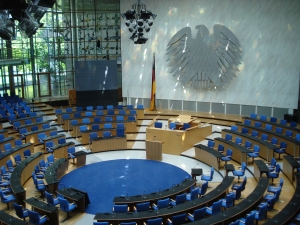

CAFC was recently accused of legitimising software patents in the US, but who is behind the effort to bring these to the EU?
Now that software patents are back on the table, it’s important to understand how the European patent system actually works. You need to know this in order to discuss the unitary patent and FSFE’s demands with the MEPs you call and ask for support.
The most surprising point is that the European patent system isn’t actually in any way related to the European Union. Instead, it is run by the European Patent Organisation (EPOrg). This is an entirely different organisation from the EU. It is governed by the European Patent Convention. The EU and the EPOrg are two separate supranational bodies. The EPOrg is not subject to decisions of the European Union or the European Court of Justice.
The EPOrg consists of two bodies: The European Patent Office (EPO) as an executive body, and the Administrative Council as a supervisory body. The Administrative Council exercises very little control, so that the EPO basically runs itself. While the EPO claims that it merely administers existing law, it has over the years, little by little, reinterpreted the limits of the European Patent Convention.
The AmeriKat urges readers to distribute these documents to your contacts in the media, government and industry. When the Max Planck Institute flexes their intellectual muscles and concludes that the unitary patent proposals have the potential to be worse than the current system, its time for politicians in Brussels and the Heads of State to listen.
For a couple of years, patents have hit the headlines with companies struggling to buy out portfolios of bankrupted competitors, with more and more ridiculous obvious patents granted by patent offices, or with “trials of the century” going on and on. This inflation of concerns around patents has culminated on August 24th, 2012, with Samsung being found liable for infringing some of Apple's mobile patents by a Californian jury. This over one billion dollars fine has given concrete expression to Steve Jobs' testimony, as laid down in his posthumous biography: “I’m going to destroy Android, because it’s a stolen product, I’m willing to go thermonuclear war on this.”
Soon after, Apple and Google stopped returning phone calls. The company behind Siri switched its partnership from Phillips to Ricci’s firm. And the millions of dollars Phillips had set aside for research and development were redirected to lawyers and court fees.
When the first lawsuit went to trial last year, Phillips won. In the companies’ only courtroom faceoff, a jury ruled that Phillips had not infringed on a broad voice recognition patent owned by Ricci’s company.
But it was too late. The suit had cost $3 million, and the financial damage was done. In December, Phillips agreed to sell his company to Ricci.
The Apple v. Samsung battle is being fought just as hard after the trial as before it and during it. Maybe harder. If you've ever wondered how it would look if your lawyer really fought hard for you, this is how. Both sides are doing everything they can think of for their client, but particularly Samsung. It's quite a sight, I must say.